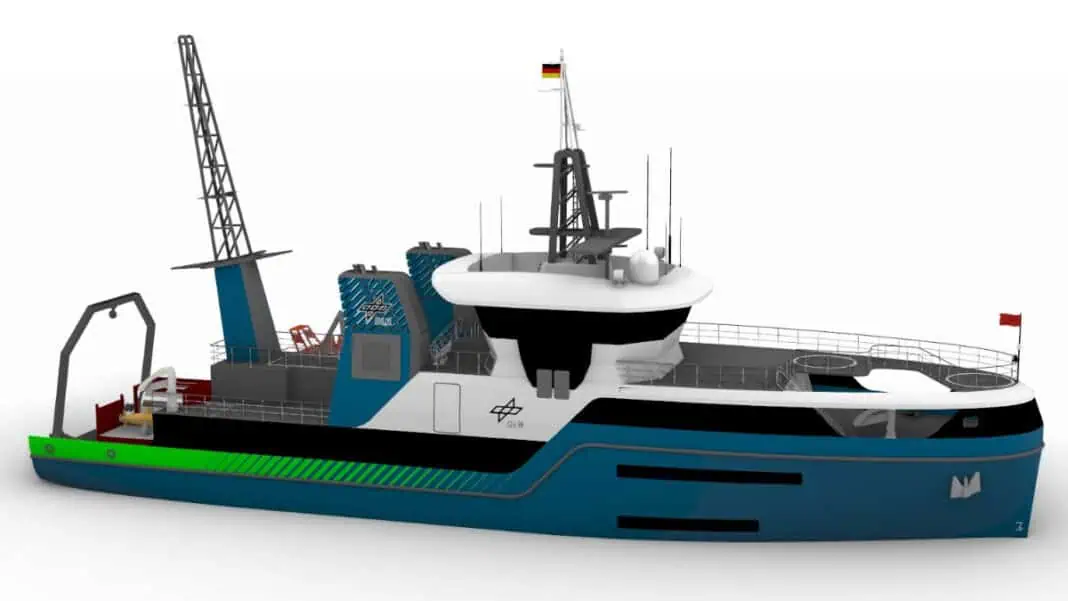The German Aerospace Centre (Deutsche Zentrum für Luft- und Raumfahrt; DLR) has commissioned Lloyd Werft in Bremerhaven to construct a new state-of-the-art research vessel. The contract was signed on February 3, 2025, marking a significant step forward in advancing maritime research into innovative, climate-compatible propulsion technologies.
With an estimated cost of 36 million euros, the vessel will serve as a collaborative platform for the maritime industry, enabling researchers and industry partners to develop and test sustainable propulsion solutions. The vessel is scheduled for completion in summer 2027 and will play a key role in supporting the transition to greener maritime operations.
“The new DLR research ship will serve as a unique laboratory for real-world experiments,” said Anke Kaysser-Pyzalla, Chair of the DLR Executive Board. “At the same time, it will create new opportunities for public stakeholders in the transition towards digital, climate-compatible, competitive and safe maritime mobility and industry. With its interdisciplinary research approach, DLR is also highly sought after in the maritime sector by industry and the public sector. In Lloyd Werft, we have found a capable contributor for the construction of this unique project, bringing together tradition and innovation at the Bremerhaven site.”
Friedrich Norden, Managing Director of Lloyd Werft Bremerhaven, added, “We are delighted to support DLR’s valuable research projects through this unique initiative. We will soon be delivering an innovative platform for testing future maritime energy systems under realistic onboard conditions. This flagship project highlights the importance of maritime research in Germany and actively contributes to shaping the maritime energy transition. Both the Lloyd Werft workforce and the entire Rönner Group share this commitment. This contract also demonstrates that Lloyd Werft is not only a strong project contributor in ship repair and conversion but also a key player in the construction of specialised vessels and complex custom-built structures.”
The DLR Institute of Maritime Energy Systems, based in Geesthacht and Kiel, is dedicated to researching and developing new solutions for the integration of renewable energy into the maritime sector. In collaboration with the Hamburg-based engineering firm SDC Ship Design & Consult, DLR has developed the overall design for the new research vessel, which is now under construction at the Lloyd Werft shipyard.
This initiative is a key step towards promoting climate-compatible shipping by eliminating reliance on fossil fuels in favour of alternative propulsion technologies. The vessel will feature a specially designed test engine room, where DLR researchers, along with cooperating companies from the maritime industry, will trial hydrogen-based and battery-powered propulsion systems. It will also enable the real-world testing of uncertified components, such as energy converters and reformers. A key focus will be ensuring that the energy generated can be safely integrated into the onboard power system and used for propulsion.
The research ship will be 48 metres long and 11 metres wide, with a draught of 3.2 metres. It will primarily operate in the North Sea and Baltic Sea on test voyages lasting from one to several days, accommodating up to 20 people onboard. Once completed, the vessel will be based in Kiel.
The research vessel will be equipped with a digital twin – a virtual replica that will enable DLR researchers to conduct extensive computer simulations to ensure the ship’s safe and efficient operation. This technology will allow researchers to, for example, analyse propulsion components and digital navigation systems in preparation for and alongside practical trials.
With this initiative, DLR is providing the maritime industry with a platform for the development, integration, testing and certification of resource-efficient, digital and intelligent maritime systems. Authorities responsible for security will also benefit, as the vessel will support DLR’s research in civil security and defence applications.












